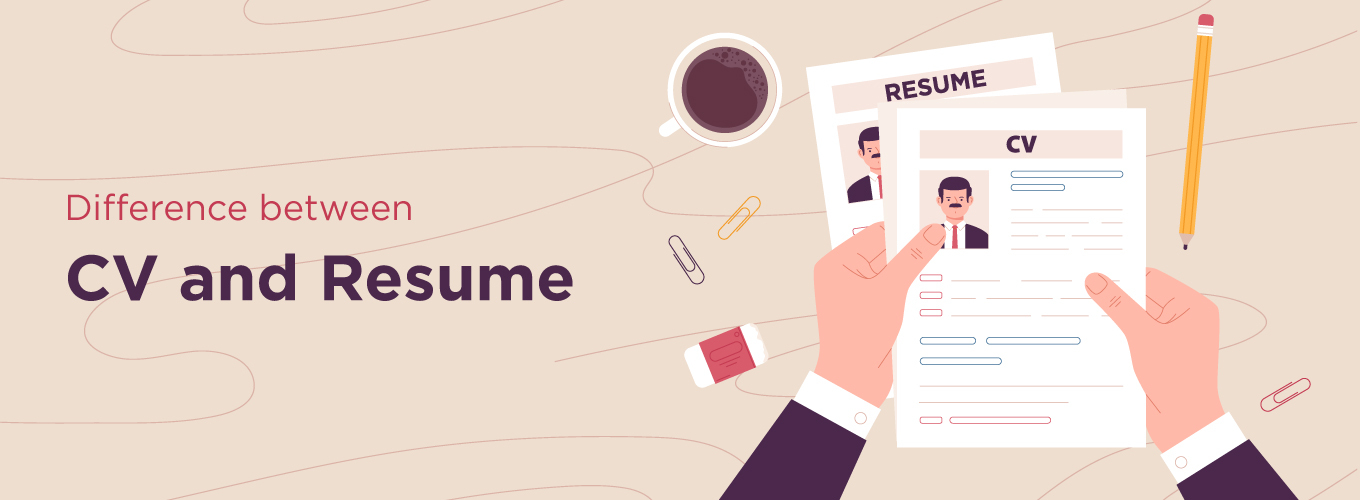What is a CV and resume?
The CV and resume are two documents presented during the application phase; however, they each serve slightly diverse functions.
A resume is an abbreviated write-up containing all the major details of one’s work record, skill set, professional certifications, and achievements. Usually, it covers a job-related topic and is rarely over one page long. A resume includes relevant work experience and skills related to the position one is applying for. They are often included in most job application forms in the US and Canada.
Another form of business document is a CV (Curriculum Vita). It includes all details regarding one’s professional background or experiences. Such a document is typically called a CV or curriculum vitae and is widely used in academic, scientific, or research areas in such countries as the UK, most European countries, and some other regions worldwide. Resumes are shorter than CVs, which have many pages that give a general picture of one’s schooling and working life.
Simply put, a resume is a customized and abbreviated summary of specific job skills and accomplishments, while a CV outlines all aspects of a person’s vocational and educational history. It is essential to consider what job you are seeking and the conventions of your country or industry when deciding whether to use a resume or a CV.
Table of Contents
What are the uses of a CV and resume?
Resume:
Tailored Summary: It is a one-page document with specialized skills, work experiences, educational background, and achievements highlighting the area of professional application for a particular post.
Job Applications: The majority of hiring practices in the US or Canada involve resumes, especially none in academic or scientific circles.
Concise Presentation: They are short and pithy highlights of the fact that the applicant is qualified for the job and they are no more than two pages long.
Highlighting Skills: Skills and job-specific experience are to be emphasized in the resume.
Quick Review: They can be skimmed by recruiters who, within only a few seconds, know whether the candidate is the right fit for an opening.
CV (Curriculum Vitae):
Comprehensive Overview: The CV is a framework for everything that has been achieved in academics. This includes degrees, research achievements, published works, grants received and won, and awards won.
Academic and Research Fields: It is common to find Curriculum Vitae being written in the UK, Europe, and other parts around the world for academic, scientific, and research purposes.
Length and Depth: They are often extensive and spread across few or many pages depending on the accomplishments of an individual or a resume.
Detailed Information: Such extensive specifics as the research projects, teaching experience, the conference presentations, among other academic and research-oriented issues of CV are as pertinent.
Complete Profile: A CV accurately portrays a prospective candidate’s skills and qualifications appropriate for jobs that necessitate detailed knowledge of a person’s capabilities and achievements.
What is the difference between a CV and a resume?
Even though CVs and resumes can be major tools in a hiring process, they are quite distinct among themselves on the issues of length, structure, and content. A resume is usually short (one or two pages) and contains an overview of achievements, skills, and former work. Specified information about a particular type of job application and necessary data on potential employers’ needs. Resumes are common in situations that demand briefness and clearance due to rapid assessment by prospective employers.
In contrast, a CV is an extensive document that exceeds the length of a resume and provides more information, such as research, courses, presentations, training, and overall job descriptions. In academic, medical, and research-related environments, resumes are used to give a full outline of the applicant’s professional career.
What is the key difference between CV and resume?
CV and resume are based on the size of the text, its objectivity, and what information it provides.
Length and Depth: Short statements capturing personal information (name), current position, work experience, skills, qualifications, and personal details such as date of birth. On the other hand, a CV (Curriculum Vitae) tends to be much more inclusive, frequently covering no less than two pages of information about one’s entire career, including but not limited to education, research, publications, conferences, etc.
Purpose: A resume is specifically customized for certain jobs and concentrates on highlighting related competencies and qualifications. Conversely, CVs apply to academic, research, or medicinal fields and depict each step of one’s professional or academic career.
Geographic Usage: In the US and Canada people generally give preference to resumes whereas CVs are preferred by jobseekers in Europe, the Middle East, Africa, and Asia.
Content Emphasis: Just like the resume focuses on the job experience or matters dictating a position, a CV highlights academic awards, research findings, and published and presented work.
However, even though they both share the same beliefs about employee qualifications, a resume is limited, but on the other hand, a CV covers a person’s entire career, going deeper into the academic or scientific circles.
Conclusion
It is possible to say that a resume, as well as a CV, are used in hiring and from your particular qualities and achievements that are relevant to the recruitment process.
A two-page resume is relevant to the most significant character features, relevant job experience, and achievements appropriate to the job search. Candidates give the most detailed information in their resumes such as personal qualifications for the particular position. These exams are well received in America and Canada as they are written to recruit people into different sectors.
In contrast, a CV goes beyond that and is extended covering a candidate’s educational background with publications, presentations, grants, honors, and extensive professional experience. CVs, originating in academia, science, and medicine, are the most common in Europe, North Africa, East Africa, and Asia.
Eventually, a resume is a short and personalized recruitment tool showcasing job-related qualifications for a particular job. Subsequently, a CV gives a complete overview of the entire career, education, and work experience. One should be aware of the differences in various countries and industries while seeking the appropriate document for applying.
Frequently asked questions
1. The main difference between a resume and a CV is that
A resume represents a summary of one’s job experience and qualifications, and it is advisable to include only essential things in a one- or two-page document. While a CV is a more detailed document that summarizes an applicant’s academic and professional achievements through multiple pages, the Resume focuses on a clear overview providing a summary of key qualifications
2. When should I use a resume and a C.V.?
Resumes are the primary document used in the job application process by employers in the United States and Canada, particularly for private sector-level jobs. On the other hand, international job applications or ones that require a candidate to have an academic or research background are better prepared by using a CV that gives a detailed overview of one’s whole career.
3. What are the common characteristics of a CV that are distinct from those of a resume?
CVs are written with specific details such as publications, presentations, conferences attended, and research experience which figures rarely in resumes. Besides, CVs can supply more comprehensive information on educational attainments, such as degrees held, research projects done, and teaching experience.









